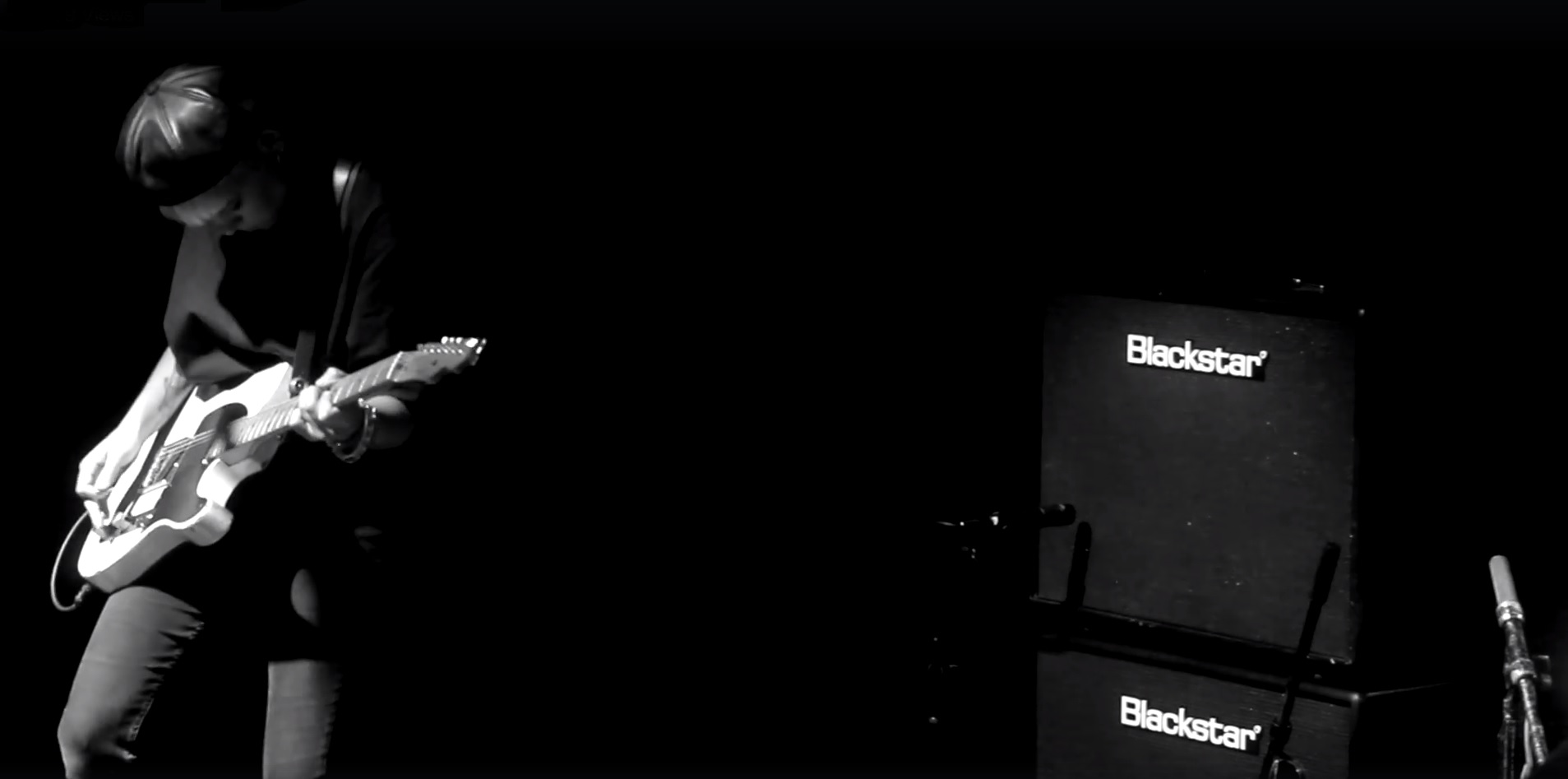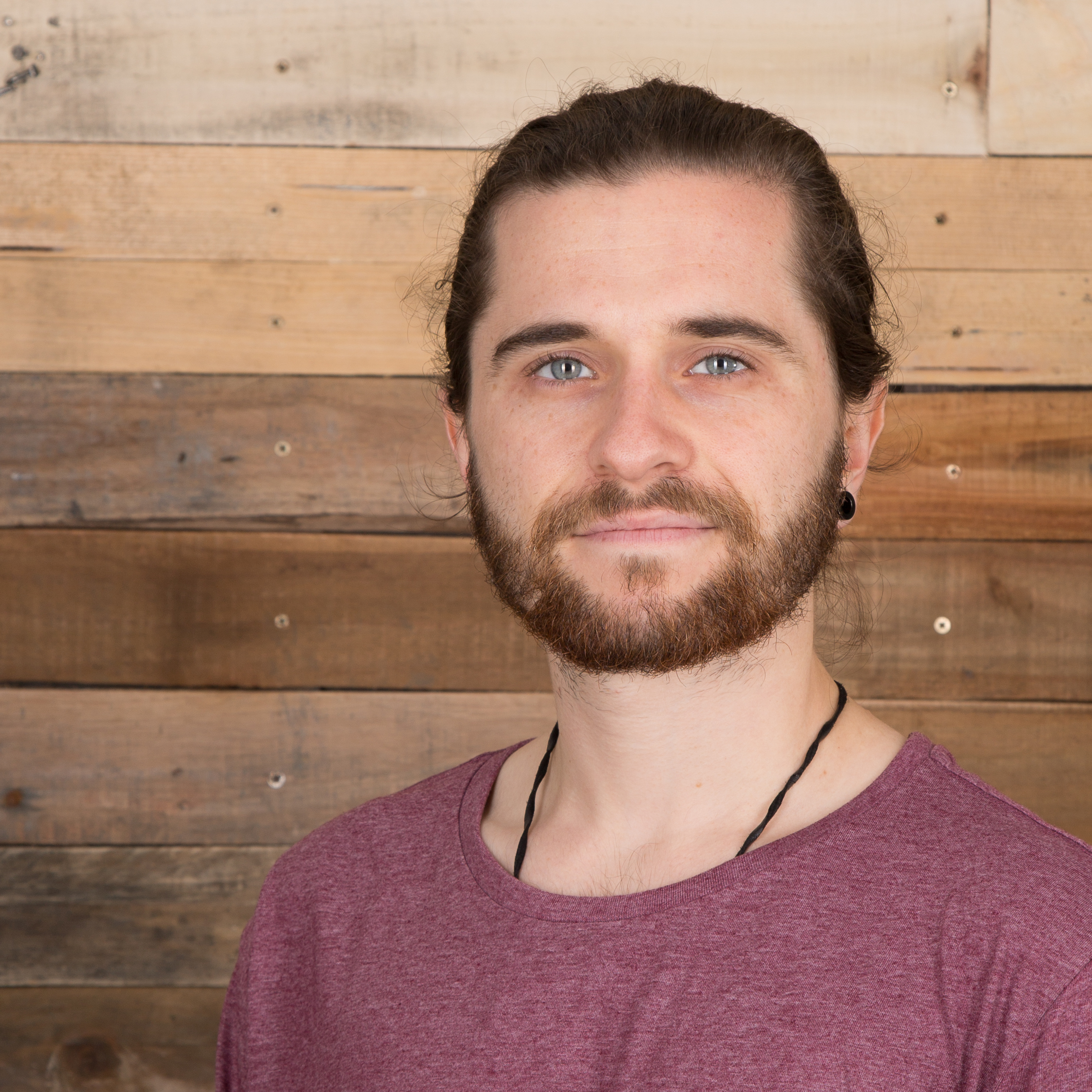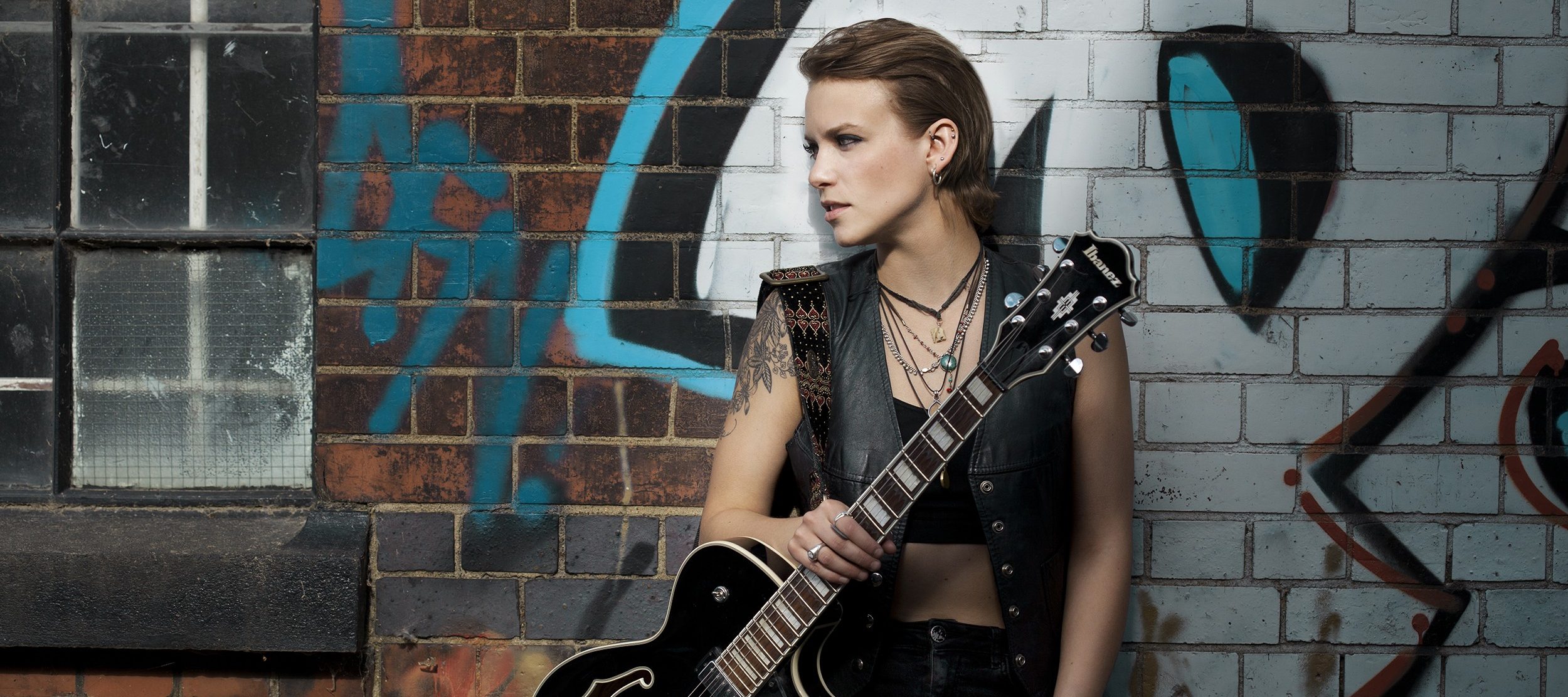Carmen Vandenberg has been busy making waves in the guitar world; a lover of blues since a young age, she earned her stripes on the European jam night circuit before heading to the Academy of Contemporary Music (a stone’s throw away from our store in Guildford) to study. Upon graduation, she immediately set out to make an impact on the UK session scene, landing gigs with the likes of Kate Nash, Cher Lloyd and Alesha Dixon among others. Nowadays, she divides her time between her own band, Bones, guitar duties for the one and only Jeff Beck, and raising a middle-finger for gender equality in the industry…
Interview with Carmen Vandenberg
We caught up with Jeff Beck, Dave Stewart and Roger Mayer collaborator Carmen Vandenberg to chat about all-things-guitar!
Thanks for taking the time to chat with us! So we’ll start with the simple stuff; where are you at the moment and what are your current projects?
I’m living in Los Angeles – La La Land – and my main focus at the moment is my band called Bones. That’s basically the reason I’m here!
How did Bones come together? What was the process behind it?
Rosie and I met in Camden. I think it was probably at a blues bar, a jam night or something like that. We met and started chatting, we had a few whiskies, and we decided to start writing some music together! We started writing some songs, and that’s when I got Filippo involved. Filippo and I met at ACM in Guildford, and it all just kicked off from there. As soon as we started doing cool things, we said ‘f*ck trying to do this in London – let’s go to LA!’ and we did it! We all saved up working in different places and we just did it!
That’s a rock ‘n’ roll story right there! Now here at Andertons, we like talking about equipment and other nerdy things – what are the main features of your current rig with Bones?
Both Rosie and I are endorsed by Blackstar now, which is great! I’ve got an Artist 30, and I like the Artisan as well. The Blackstar amps are really good – we’re using them this weekend at NAMM! For my sound I use a lot of different things; I’ve got a Catalinbread fuzz pedal that I really like, and I use a bunch of octave pedals. I’ve got the new Archer Overdrive pedal as well, I stole that idea off Jeff [Beck]! I’ve got a delay, both long and short. I haven’t played live in a little while, I need to pop over to the studio and check, ha!
Have you got so used to playing that you forget what’s actually in your rig?!
Well the stuff I use for Jeff is different to what I’d use for Bones. It’s also just been Christmas – we haven’t played any shows for a little bit so I’ve just forgotten! Oh wait, there’s an MXR boost! We use a lot of MXR stuff now ‘cos they endorsed us too! MXR and Dunlop both do some really cool stuff.

You seem to favour Fender guitars of all shapes and sizes; is there something in particular that draws you to Fender?
I’ve always loved Fender, and I really love Teles! My Tele is my main guitar for when I play with Bones. When I play with Jeff I’ve got my Custom Fender – I’m also endorsed by Fender which makes it easier to work with them! I love them so much. My Strat is good for playing with Jeff because it allows the versatility you need tone-wise, whereas with Bones it’s all Tele, cranked up full, bridge pickup – just that sound. It stays that way!
Amazing! Have you ever modified any of your gear or do you keep it as intended?
I think I tried when I was younger to do something to a Rat pedal that made it sound worse! I’m not very good with the geeky side of things, I just know when I like the way something sounds! I’m not nerdy enough to know why something sounds like it is, I just know that I either like it or I don’t – that might sound a bit douchey!
Have you ever experimented with modelling amps vs. valve amps? Do you have any preference?
I’ve got a Fender Mustang that’s got digital effects built-in, that’s the closest thing to a modelling amp that I’ve got. I use it as a practice amp and it really does sound good, but it doesn’t have the substance that a valve amp would have, the meatiness. They’re really good and I enjoy using them; I actually did some Mustang presets for Fender a little while ago! It’s cool ‘cos you can use an app to find different presets and stuff – I haven’t played with it much but I know that my presets are in there somewhere! I think they’re great for practising and figuring out what you want from your sound, because you can try so much without having to spend so much money! But I always like the old-school valve amp sound.
What would be your all-time favourite pedal?
I’m into the Archer now. I go through phases, falling in love with one pedal, and then moving on to the next!
I remember you saying once that you worked with the legendary Roger Mayer – could you tell us a little bit about your experience working with him?
Oh, I love his stuff! Roger’s a great guy. I met him while I was still at ACM; he came to one of our shows, a cover band that we had at the time. We worked together for a while, and his pedals were great. I used the Mongoose for a while! He was able to bring out all of the subtleties of your instrument. He’s a great guy, just the fact that he built Jimi Hendrix’s first fuzz pedal, some of the stories that he has, all of the records that he worked on – he’s always prepared to tell you an amazing story that’ll blow your mind.
Mind-blowing indeed. Now a little about your playing style: it sounds like you draw a lot of influence from old-school blues players. Is that something that you grew up with or did you develop a love for it in time?
I’ve always loved blues since I was a kid – even my parents didn’t really understand why at the age of 7 or 8, I was so attracted to the genre! I don’t actually have an explanation for it, I just always have! It just makes me feel sad and happy at the same time, I think that’s what blues is supposed to do. It’s always just been there, only growing and developing further. As you grow up you learn more and more about it and whatnot.
You spent a lot of time studying guitar and music in various places, including right here in Guildford at ACM! How did that affect your playing and your attitude towards guitar? Did you find that it made a difference to you?
Yeah, I think practicing will always make a difference and if you’ve got someone who gives you deadlines and instructions that’ll help – but I also think that you learn as much from the people you surround yourself with. Whether it’s classmates or just friends – as long as you just want to learn and listen, you will! I think the structure did help – at least it motivated me!
Since studying, you’ve worked on a whole bunch of different things, including Kate Nash, Cher Lloyd and various other session projects. Did you find that you were able to bring your own style of paying into those projects, or did you have to adjust a lot to fit in?
With Kate Nash there was an element of freedom, especially when we wrote and recorded the other album (Girl Talk). On the previous stuff I was just playing what had already been played, but with the second album there was a bit more creative freedom which was cool. In general, the pop thing – or just session stuff in general – you’ll just have to stick to what’s needed from you. That’s why I like playing and writing with my own band so much. You have the total freedom to express yourself. Having written Jeff’s album with him and written and performed with so many people, I don’t think I could go back to just doing what somebody needs! Having said that, if it’s someone like Jeff Beck, I’ll definitely do what it takes to learn what’s needed – I was just in awe learning from him. Your own style will always come out in your playing, but you sometimes have to limit it.
Let’s talk more about Jeff Beck – where do we begin? If you could sum up working with Jeff Beck in three words, what would you say?
Inspiring…overwhelming…fun!
What was your favourite thing about working with him? An obvious question…
Just listening to him play! He was my mentor for that year and a half, so writing with him was one thing – constantly writing and recording the album (Loud Hailer) in the space of three months – but then the scariest bit for me was learning all of his back catalogue. We were going out on the road, and that was when I freaked out a bit! I hadn’t really thought about the fact that I’d be playing the whole set, we were so focused on the album. It was amazing, but I was beyond nervous for the whole first American tour! I was practicing so much, but I really got to enjoy the second and third tours; we had the best time ever in Japan, I fell in love with it there!
Jeff said that the writing and recording process for Loud Hailer was really organic and free-flowing; did the experience and process of making the album differ from what you were expecting?
No, we didn’t really have time to think about it! We just sat in front of his fireplace with some prosecco and we just got the whole thing done. There wasn’t time to think, we just thought ‘how do we get this done? How do we make it sound as cool and modern and awesome as it could be?’
You said that he mentored you during that time; did he share any particular interesting bits of wisdom or knowledge in the time that you worked together? Was there anything in particular that stuck out?
In general just sitting there listening to him play, we picked up stuff. You come away thinking ‘how do you do that?’ – it’s amazing!
You spoke about your nerves when touring America with him, and you’ve played to some pretty big crowds in the past; have you ever been nervous before or experienced any kind of stage fright? If so, do you have a solution?
For me, the fact that the audience was probably 80% guitarists made me the most nervous. I couldn’t f*ck up – the fact that I’m a girl also made me think that people would say ‘she only got the job because she’s a girl!’ There was no way I could make mistakes, so yeah – for that first tour, I could tell you where every restroom in Madison Square Gardens or somewhere where I felt sick before going on stage! Definitely a lot of nerves when you’ve got people like Jimmy Page watching from the side of the stage, you feel like the pressure’s on! You just get used to it – I just sat down and practiced until I was sure I wouldn’t mess it up!
You mentioned being a girl and being a guitarist – Fender stated that up to 50% of their recent guitar sales were to women, and there are suggestions that more and more young girls are picking up guitars than ever before. How does it feel to play a part in that shift of attitude in what is otherwise a male-dominated industry? Do you feel a part of that?
I just think that it’s still in the process of changing, I haven’t witnessed the big change yet. I just want to be able to inspire girls, so that they know that they can do it without the pressure that I had to go through. I’d like it to be a normal thing, for there not to be so much pressure. Even for it to just stop being a topic of conversation, because it’s just so normal! I just think it shouldn’t be an issue. The other thing is this expectation for girls to just be playing guitar to accompany their voice; they’re never allowed to be just guitarists! When I was growing up, all my heroes and inspirations were male guitarists, I had no women. It would be nice for there to be more so women and young girls could be inspired. I mean there are; Susan Tedeschi is one of my favourite guitarists, Jennifer Batten was incredible…but you could count them all on one hand.
Similar to what you’ve just said, we’ve heard a lot of horror stories of female players and musicians feeling patronised and singled out because of their gender. If you don’t mind me asking, have you ever had any frustrating experiences where you feel you’ve been singled out?
Yeh, loads of times. As a female guitarist, first of all, you get put down if you’re not fast enough, you’re not shredding as much as others. Then if and when you start getting jobs, they say that you got the job only because you’re a girl, because they needed a girl. It’s not about you being good, it’s all about your gender. If you survive that, if you pass through, you’ll reach a point where it’s not an issue, but sadly everywhere you go you’ll still have someone who has to make a comment. It doesn’t really stop, but your attitude towards the comments can change – I don’t care anymore! Times will change, but everything takes time!
Indeed! Final question: what’s happening next? What’s in store for 2018?
We just did a cover of a Bowie track for Howard Stern which is coming out in the US in February. The song that he asked us to cover is called ‘I’m Afraid of Americans’ which is perfect! Then we’ve got a video that’ll be coming out, and a few tours that we can’t talk about because they haven’t been announced yet! We’re staying in America, doing a lot of exciting things with Bones, plus Jeff will be recording early 2018. I can’t say too much but it’s all exciting!
Wonderful! Well thanks again for taking the time to chat to us from across the pond – if you ever find yourself back in Guildford make sure you come and say Hi!
My pleasure – will do! Thank you! I’m going to have some coffee now…
Did you enjoy reading this insightful interview? Leave a comment below and share your thoughts!
If you’re interested in learning about some of the scenes biggest names right now, check out more of our Industry articles by clicking here.




Responses & Questions